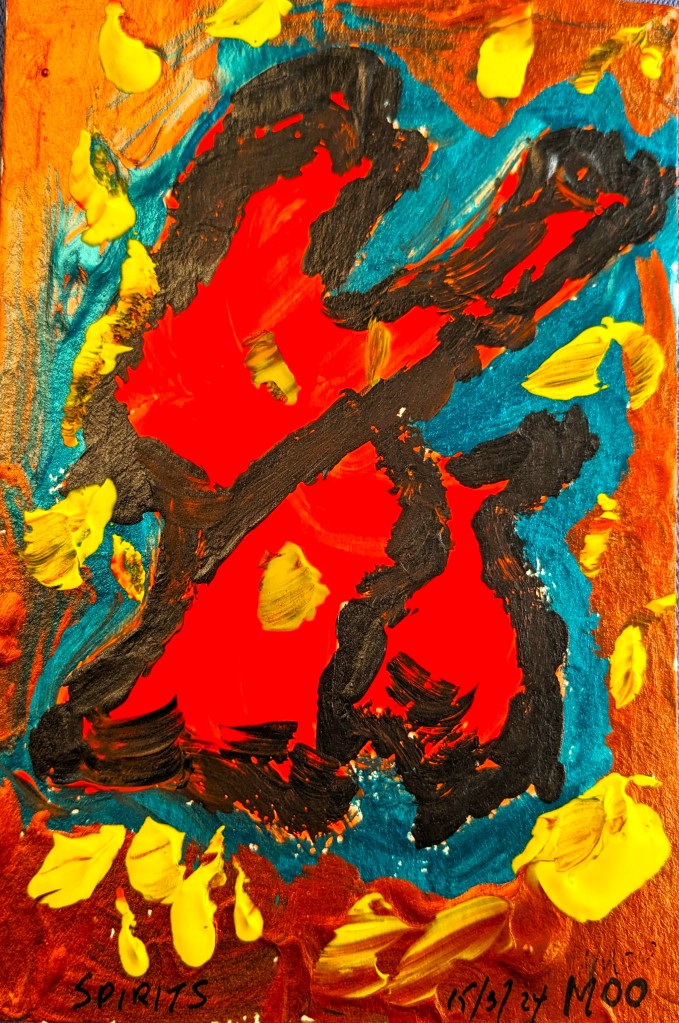A Broken Heart
What does a broken heart look like? Good question – and I, for one, don’t know. Maybe my artist friend, Moo, does. He painted this image of a Fragmented Heart the other day. Not that his heart was broken. He told me he was interpreting the words and feelings of a close friend (who shall remain nameless) who has been having the feelings associated with a heart that was actually breaking. Tough times, eh?
Rejections get me down and annoy me, but they don’t break my heart. I submitted a short story to a magazine on January 4, 2023 and got a rejection letter yesterday, May 6, 2024. It was a form letter, 16 months after submission, just to say “no”!
Of course, the few acceptances that I actually do get make up for the many rejections, as is always the case. However, there seem to be fewer of these acceptances as my thoughts look inwards and I turn from ‘poetry of play to poetry that expresses the authenticity of being‘ (Johannes Pfeiffer). In this day and age, I fear that readers seek entertainment and distraction and prefer the light-hearted to the heavy hand of deep thought and poetic authenticity. And remember, I do not distinguish between poetry and prose, as many do. For me, poetry is writing, be it in poetry or prose.
But back to the theme of the broken heart. Here are three linked poems.
Old Wounds
“The slow wound
deepens with the years
and brings no healing.”
The Minister by R. S. Thomas
How deep time’s wounds
have cut and carved,
not just in flesh and bone,
but in the embers
of that slow-burn fire
they call the heart.
Memory and mind
have also played their part.
Some days, those wounds
don’t ache at all.
But there’s no real healing,
and a moment of madness
or a knife-edged finger nail,
careless, in the dark,
opens them up again
to bleed afresh
and remind us
of the frailty of the flesh.
I Remember
“I remember so well how it was back then.
I was lonely, my heart so broken I couldn’t
count the pieces, nor put the puzzle together,
although I tried so hard to make it whole again.
I still bear scars, trenches dug so deep,
lines gouged into my body. I can’t always sleep.
Nightmares pave a crooked, cobbled way to day.
Some nights, I wake up suddenly from a dream
and scream the way that stuck pigs scream
when, hot, their blood comes steaming out.
Other nights, in pain and panic, at shadows I shout.
I search for someone to care for me. I want them
to understand my grief and help me forget the thief
who stole my joy and left me this life of disbelief.”
Signs of Age
What is pain, but the knowledge
that we are alive, and relatively well,
and still on the green side of the grass.
Long may it last. For when the pain is gone,
we shall soon follow. And this is age,
and age is this pain, and the painful
knowledge that we are no longer young,
can no longer bend the way we bent,
or touch our toes, or even see our toes,
some of us. The golden arrow pierces
the heart. Fierce is the pain. But when
that arrow is withdrawn and the heart
no longer feels alive, why, how we miss
that pain, how we weep to find it gone,
perhaps never to come back again.
Pain, like rain, an essential part of the cycle
of the seasons, of the days and the weeks,
and all the months and years that walk us
around the circadian circle, in time with the earth
and its desire to open its arms, and welcome us,
and greet us, and bring us our rest, from pain.
So much wisdom sewn into the wrinkled skin,
the gap-filled grin that glows with humor,
the crow’s foot signals of old age,
or merely those we associate with ageing,
and the knowledge that, yes, many
have walked this wobbly way before,
and many more will follow in our footsteps.
Take your pick – ‘poetry of play to poetry that expresses the authenticity of being‘ – but I know which I prefer and ‘still I live in hopes to see poems of authenticity.”













